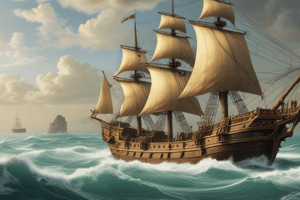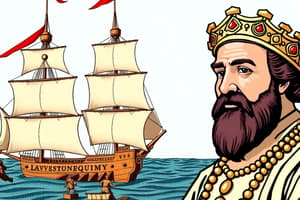Podcast
Questions and Answers
What strategic location did the Portuguese aim to control in the Arabian Gulf region?
What strategic location did the Portuguese aim to control in the Arabian Gulf region?
- Bahrain
- Strait of Hormuz
- Persian Gulf
- Island of Hormuz (correct)
Which of the following was a significant response by the Mamluk state to the Portuguese presence in the Indian Ocean?
Which of the following was a significant response by the Mamluk state to the Portuguese presence in the Indian Ocean?
- Expanding their territory in East Africa
- Sending troops to India
- Establishing a naval campaign in 1505 (correct)
- Forming an alliance with the Safavids
Who led the Mamluk fleet during the conflict with the Portuguese in 1509?
Who led the Mamluk fleet during the conflict with the Portuguese in 1509?
- Hussein al-Kurdi (correct)
- Alfonso de Albuquerque
- Lorenzo de Almeida
- Ismail Safavid
What did the Treaty of Hormuz signify for the relationship between Persia and Portugal?
What did the Treaty of Hormuz signify for the relationship between Persia and Portugal?
What did the Portuguese agree to provide to the Shah of Persia under their alliance?
What did the Portuguese agree to provide to the Shah of Persia under their alliance?
Which ruler resisted Portuguese occupation in Bahrain?
Which ruler resisted Portuguese occupation in Bahrain?
What was one of the outcomes for the Safavid state after the Treaty of Hormuz?
What was one of the outcomes for the Safavid state after the Treaty of Hormuz?
What was a key reason for the Mamluks' concern about Portuguese involvement in the Indian Ocean?
What was a key reason for the Mamluks' concern about Portuguese involvement in the Indian Ocean?
What was one of the primary reasons the Ottoman Empire shifted focus towards the Gulf and Arabian Peninsula in the sixteenth century?
What was one of the primary reasons the Ottoman Empire shifted focus towards the Gulf and Arabian Peninsula in the sixteenth century?
Which battle marked a significant victory for the Ottoman Empire against the Safavid Empire?
Which battle marked a significant victory for the Ottoman Empire against the Safavid Empire?
What was one of the consequences of the Portuguese relinquishing control of the Arabian Gulf?
What was one of the consequences of the Portuguese relinquishing control of the Arabian Gulf?
Who was the Ottoman Sultan during the expansion of the empire that included the province of Basra?
Who was the Ottoman Sultan during the expansion of the empire that included the province of Basra?
In which year did Imam Sultan bin Saif retake Muscat from the Portuguese?
In which year did Imam Sultan bin Saif retake Muscat from the Portuguese?
What remained a challenge for the Ottomans in their military efforts against the Portuguese?
What remained a challenge for the Ottomans in their military efforts against the Portuguese?
How did the Bani Khalid influence the Ottoman presence in the region?
How did the Bani Khalid influence the Ottoman presence in the region?
What prompted the Ottomans to send a military campaign from Egypt?
What prompted the Ottomans to send a military campaign from Egypt?
What were the main goals of the Portuguese in the Arabian Gulf during the sixteenth century?
What were the main goals of the Portuguese in the Arabian Gulf during the sixteenth century?
Which event marked the beginning of European colonialism in the Arabian Gulf region?
Which event marked the beginning of European colonialism in the Arabian Gulf region?
What was one of the reasons the Portuguese shifted their focus towards the Arabian Peninsula?
What was one of the reasons the Portuguese shifted their focus towards the Arabian Peninsula?
What strategy did Afonso de Albuquerque employ to strengthen Portuguese positions in the Gulf?
What strategy did Afonso de Albuquerque employ to strengthen Portuguese positions in the Gulf?
Which island did the Portuguese seize in 1507 to establish a military presence in the region?
Which island did the Portuguese seize in 1507 to establish a military presence in the region?
Why were the Portuguese unable to seize Bab al-Mandab and Aden?
Why were the Portuguese unable to seize Bab al-Mandab and Aden?
What contributed to the Portuguese desire to explore the inland Arab seas?
What contributed to the Portuguese desire to explore the inland Arab seas?
Which Portuguese leader is noted for significantly advancing the Portuguese presence in the Arabian Gulf?
Which Portuguese leader is noted for significantly advancing the Portuguese presence in the Arabian Gulf?
What led to the weakening of the Portuguese Empire in the Arabian Gulf during the 17th century?
What led to the weakening of the Portuguese Empire in the Arabian Gulf during the 17th century?
What was a consequence of Spain occupying Portugal from 1580 until 1640?
What was a consequence of Spain occupying Portugal from 1580 until 1640?
What was one reason for revolutions against Portuguese rule in the Arabian Gulf?
What was one reason for revolutions against Portuguese rule in the Arabian Gulf?
How did the British characterize their initial presence in the Arabian Gulf?
How did the British characterize their initial presence in the Arabian Gulf?
What was a key factor in the British and Dutch alliance against the Portuguese?
What was a key factor in the British and Dutch alliance against the Portuguese?
What did the Portuguese government impose that contributed to administrative corruption?
What did the Portuguese government impose that contributed to administrative corruption?
What significant military action occurred in 1622 regarding Portuguese influence?
What significant military action occurred in 1622 regarding Portuguese influence?
Which regional group showed resistance against Portuguese rule?
Which regional group showed resistance against Portuguese rule?
Flashcards are hidden until you start studying
Study Notes
Overview of International Rivalry
- Competitive European colonial powers and the Ottoman Empire sought control of the Arabian Gulf due to its strategic location and trade potential.
Portuguese Influence
- The Portuguese emerged as a colonial power after realizing limitations within the Iberian Peninsula, leading to maritime expansion.
- Vasco da Gama's voyage in 1498, aided by Arab navigator Ahmed bin Majid, opened trade routes to India, initiating European colonialism.
- Goals included monopolizing Eastern trade, especially spices and silk, and restricting Arab access to key waterways.
Initial Portuguese Ventures
- Afonso de Albuquerque, a key figure, strengthened Portuguese presence in the Gulf starting in 1506.
- Seizures included the island of Socotra and ports such as Ras al-Hadd, Muscat, and Hormuz, making Hormuz a significant stronghold.
- Despite resistance, they occupied Bahrain in 1521 due to its valuable pearl trade.
Islamic Political Forces' Response
- The Mamluk Sultanate in Egypt was disrupted by Portuguese naval power, prompting Sultan Qansuh al-Ghawri to launch campaigns against them.
- The Ottomans took over Egypt in 1517, inheriting the challenge of the Portuguese presence, leading to military confrontations.
- The Safavid Empire allied with Portugal to counter Ottoman expansion through the Treaty of Hormuz, enabling shared military and trade interests.
Ottoman Engagement
- The Ottoman Empire shifted focus to the Arabian Gulf in response to threats from Safavid Persia and the Portuguese.
- Key battles included the Battle of Chaldiran in 1514, which increased Ottoman territorial control but did not completely expel the Portuguese.
- After sporadic military actions, the Ottomans maintained a reduced presence in the region, notably suffering defeats.
Emergence of the Yaruba
- The Yaruba family unified Oman, resisting Portuguese rule, and recaptured Muscat in 1650, ending European dominance in the region.
Decline of Portuguese Power
- The 16th century saw Portuguese dominance, but military deterioration led to the rise of the Dutch and English in the 17th century.
- Conflicts such as the 1600 battles near Jask diminished Portuguese influence, aided by alliances with local rulers.
- Factors leading to the Portuguese decline included:
- Occupation of Portugal by Spain (1580-1640).
- Internal revolts against harsh Portuguese governance.
- Lack of military presence to enforce control.
- Corruption and monopolistic policies within Portuguese governance.
British Colonial Expansion
- The British East India Company, established in 1600, marked Britain's colonial ambitions, focusing on trade rather than direct conflict with locals.
- An Anglo-Persian-Dutch alliance formed against the Portuguese to gain maritime dominance, enhancing English influence throughout the Gulf region.
Studying That Suits You
Use AI to generate personalized quizzes and flashcards to suit your learning preferences.




